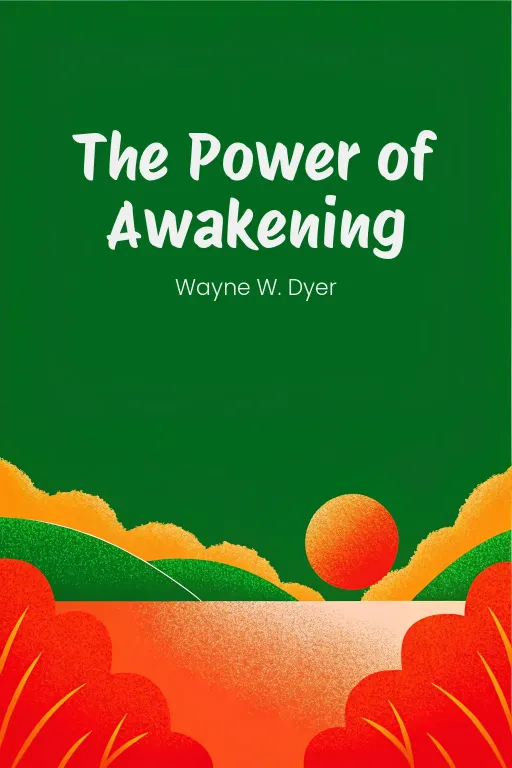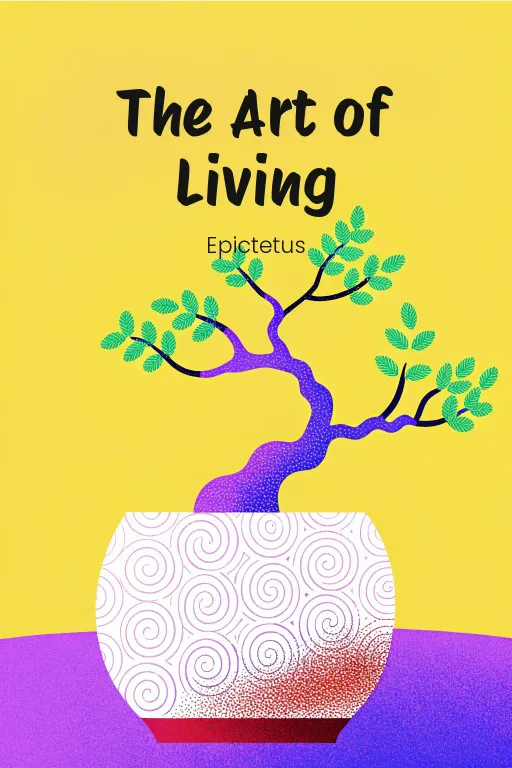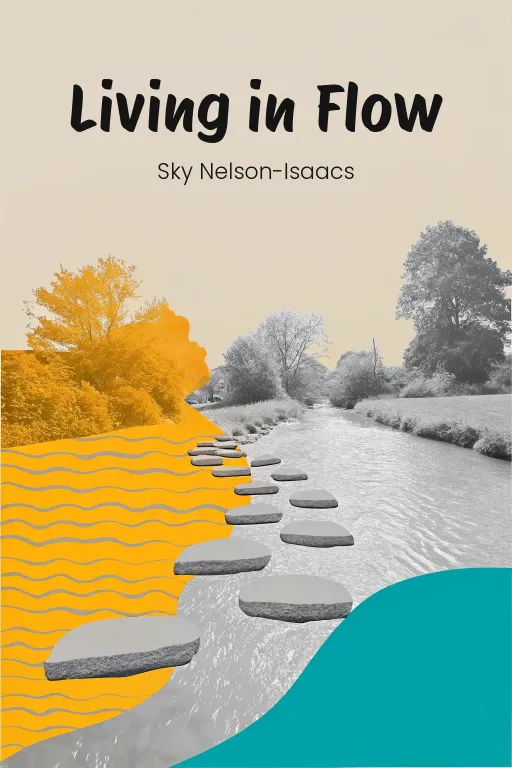
Wake Up: Find Your True North
Podcast by Beta You with Alex and Michelle
Mindfulness Practices and Spiritual Tools to Transform Your Life
Wake Up: Find Your True North
Part 1
Alex: Hey everyone, welcome to the show! Today we're diving deep into some pretty fascinating stuff: higher consciousness, spiritual growth, and what it really means to “wake up.” Now, I know that might sound a little out there, maybe even intimidating, but trust me, it’s something that resonates with everyone. Michelle: Yeah. I mean, who hasn't felt like they're just running on a hamster wheel, right? Chasing after goals that never quite satisfy? It's that whole “delayed gratification” trap we're talking about today. And, news flash, the answer isn't a bigger paycheck. Alex: Exactly! That’s where Dr. Wayne Dyer’s “The Power of Awakening” comes in. Think of this book as your user manual for breaking free from those ego-driven patterns and discovering a deeper sense of purpose. It's about switching from reacting to life to actively aligning yourself with a higher state of consciousness, where love and compassion kind of take the driver's seat. Michelle: Okay, before anyone clicks away thinking this is too woo-woo, Dyer actually gives us concrete tools. Things like meditation and mindfulness to help us apply these big ideas in our daily lives. Otherwise, it's just nice-sounding fluff, right? Alex: Exactly! So, for our chat today, we've broken it down into three key areas. First, we'll explore how to ignite that initial spark of awakening. What does it really mean to let go of those ego attachments and start seeing the world with fresh eyes? Michelle: Then, we're going to get practical. Like, seriously practical. What are the actual tools that we can use to nurture this awakening? We're talking about everyday practices like visualization and mindfulness. Think of it as spiritual growth for the real world. Alex: And then, finally, how do we actually live this awareness? How can embracing this interconnectedness and leading with love extend beyond ourselves and create actual, positive change? Imagine it like tending a garden: personal growth leads to collective change, right? Michelle: So, whether you’re a seasoned pro at this spiritual stuff or just trying to figure out what all this “higher consciousness” talk is about, hopefully today will give you some food for thought and maybe even challenge you a little bit. But without losing touch with reality, of course.
The Journey Towards Awakening
Part 2
Alex: Okay, so picking up where we left off, let's really dive into the foundations here: the journey towards awakening. As we mentioned, this is about peeling back the layers of who you “think” you are, examining your true motives, and ultimately realigning your life with, you know, deeper authenticity and purpose. It's the groundwork for everything that follows. Michelle: Exactly, and this is where Dyer doesn't pull any punches. He makes it pretty clear that awakening isn’t about just vision boarding or manifesting a yacht. It’s about looking inward and figuring out what “genuinely” drives you. Why do you want what you want? Who are you trying to impress, really? Alex: Precisely. He starts by reminding us how often we chase external validation – recognition, material stuff, social approval, the whole shebang. But, as he points out, when those things don’t actually fulfill us, we’re left with this… inner void. And “that's” the call to awaken, to fundamentally re-evaluate what truly matters. Michelle: Which is where his concept of the "inner compass" comes in, right? Because it’s not about what the world tells you will make you happy – it’s about tapping into your own internal guidance system. So, say someone is stuck in a soul-crushing corporate job just to make six figures, but secretly dreams about painting landscapes in Tuscany, how does their bank balance ever compete with their soul's calling? Alex: That’s “exactly” the kind of scenario Dyer illustrates. He talks about people choosing to leave high-pressure careers in favor of doing something more personally meaningful. Once you look inward and clarify your actual intentions, your life starts to reshape itself around those values. It’s not necessarily a walk in the park, of course, but the sense of peace and purpose you gain is unmistakable. Michelle: Okay, but not everyone can just dramatically pivot careers or reinvent their lives overnight. What about the people juggling, you know, commitments, bills, all the real-world stuff that makes a huge realignment a pretty big ask? Alex: That’s totally valid. And Dyer acknowledges that this kind of shift takes time. But remember, realigning doesn’t “always” mean completely overhauling your entire existence. Sometimes it’s about smaller tweaks, like finding moments of quiet presence in your daily routine, or reassessing what you’re truly prioritizing. Like maybe redefining success to mean valuing relationships or acts of service over titles or fancy things. Those smaller shifts can often create the space for, you know, bigger transformations to emerge naturally. Michelle: So, basically, you start with asking yourself, "What really resonates with me?"—and then adjust the dial bit by bit to get the right reception. But let’s dive into the next part here, because it’s not just about identifying intentions, right? It’s also about how we deal with life when things, inevitably, go sideways. Alex: Right, the challenges. This is where the journey really gets deep, because awakening isn’t about stepping into a bubble of positivity where nothing bad ever happens. It’s actually about “how” we handle adversity that shapes our growth. Dyer argues that challenges are actually essential – they’re like spiritual teachers in disguise. Michelle: Okay, but let’s push that idea a little, okay? I mean, say someone’s just gone through a brutal breakup, lost their job, or had a serious health scare. From their perspective, I mean, where's the "lesson" in what feels like utter chaos? Alex: It often doesn’t feel like a lesson when you're right in the thick of it, does it? But Dyer really emphasizes that shift in perspective – moving from "Why is this happening to me?" to "What can I actually learn from this?" He even shares his own deeply personal example – his troubled relationship with his father. That unresolved anger could have weighed him down forever. But he reframed it as an opportunity for spiritual growth, learning forgiveness, and even gratitude along the way. Michelle: Alright, but come on, forgiveness is way easier said than done. Where do you even start with something like that? Alex: It always starts small, right? Maybe with some self-reflection, journaling, or just acknowledging the emotions rather than suppressing them. The point isn’t to excuse anyone's bad behavior but to stop carrying the weight of it yourself. Dyer’s core point is that pretty much every hardship has the potential to illuminate some part of yourself. Take that breakup scenario – yeah, it hurts a lot. But it might reveal areas where you've been, you know, compromising your own needs, or teach you what you truly value in a partner moving forward. Michelle: I like that you said "potential," because not every challenge feels immediately transformational. I mean, I can't picture someone going through, say, massive financial hardship and thinking, "Oh, what a great spiritual opportunity!" Alex: True, but the perspective we bring to the hardship really makes all the difference. With financial struggles, it might not feel enlightening at first, but it can teach resilience, resourcefulness, and even gratitude for the things in life that aren't material. Dyer's entire message is that we become better equipped to weather life's storms by shifting our mindset. Michelle: Fine, I’m on board with that so far – clarify intentions, embrace these challenges. But where does this next piece fit in – the idea that our thoughts literally shape reality? That one always feels a bit airy-fairy to me. Alex: This is where Dyer tries to tie it all together. He argues that our thoughts don’t just passively reflect reality – they actively mold it. The way we think, what we focus on, creates this kind of ripple effect, influencing our perceptions and actions, and ultimately our outcomes. Michelle: Okay, but this "thoughts shape reality" thing always sounds dangerously close to blaming people for their misfortunes, like, "Well, if you'd just thought more positively, you wouldn't be in this mess!" Alex: That’s a totally valid concern. But Dyer doesn't frame it that way at all. He’s “not” talking about blaming anyone for factors outside their control. Instead, he's saying that, within what we “can” control, our mindset really becomes a super powerful tool. For example, he cites studies where consistent visualization – focused thinking—resulted in tangible changes because it helped people notice and then act on opportunities they might have otherwise completely missed. Michelle: So it's less “magic wand” and more, like, “subtle reprogramming"? As in, instead of obsessing over your limitations, you start gradually planting seeds of possibility in your brain. I guess I can see where he's going with that. Alex: Exactly! It’s about cultivating the mental environment for growth. Imagine someone wants to switch careers but is just paralyzed by self-doubt. If their internal monologue is just a constant loop of "I'm not qualified," they're going to overlook opportunities to learn and grow. But if they shift to something like, "I am willing to learn and adapt," they suddenly start seeing resources and connections everywhere. The opportunities were probably always there – it's just the shift in mindset that made the difference. Michelle: So, the toolkit, in practical terms, includes visualization, mindfulness, consciously redirecting those negative thoughts in your head. I mean, it still sounds like work, but I get how it all connects to awakening. It’s gradual, but it’s progress. Alex: And that’s really the beauty of it. Awakening isn’t some linear destination, it's more like... a lifelong practice. By focusing on clarifying your intentions, embracing challenges head on, and cultivating empowering thoughts, you really lay the foundation for deeper growth and fulfillment. This is the core work that sets the stage for truly living a more awakened life.
Tools for Spiritual Growth
Part 3
Alex: So, having explored the initial steps of awakening, let’s dive into the practical tools that can “really” drive this transformation forward. Building on what we discussed, this segment focuses on tangible methods, things like visualization and meditation, that are designed to sustain and deepen your spiritual growth. These aren't just abstract theories; they're everyday practices we can all incorporate to align our intentions with reality and unlock a more lasting inner peace. Michelle: Okay, "tools"—I like that. We're talking practical application. I’m definitely on board with this because, honestly, the idea of “awakening” can feel so big and vague. But if Dyer's giving us a concrete toolkit, then I'm all ears. Where do we even begin? Alex: Let's start with one of the most impactful tools he mentions: visualization. It's more than just daydreaming about achieving something; it's about painting a vivid mental picture of your goals, linking that image to the emotions you’d feel when you achieve them. Michelle: So, not just saying, "I want a promotion," but “really” visualizing yourself in that new office, hearing the congratulations from colleagues, maybe even… smelling the coffee brewing in the break room? Alex: Precisely! It's a multi-sensory experience. Dyer even shares a study about individuals who clearly visualized their career goals, like landing a specific role, reaching a certain income, or stepping up as a leader. The amazing thing is, within three months, they all achieved their goals. Their visualization helped them sharpen their focus, prime their minds to be alert for opportunities, and guide their actions. Michelle: Three months? That sounds... incredibly optimistic. Are you telling me that just by imagining a different life, the universe just conveniently delivers it to my doorstep? Alex: Not quite. The core concept isn’t about magical thinking. Visualization “really” rewires your brain to recognize opportunities you might have missed otherwise. Think of it like fine-tuning a radio to a very specific frequency. When your thoughts resonate with an intention, you unconsciously steer yourself toward the right actions, connections, and resources. The universe isn't delivering it, you're attracting it. Michelle: I see, so if you're actively picturing success, you're more inclined to recognize what success actually looks like in the real world – and potentially even create it. But Dyer talks a lot about mindset, doesn't he? So, does visualization still work if your thoughts are constantly battling doubts or scarcity? Alex: That's a very insightful point. Absolutely not. Developing an abundance mindset is key. Dyer always emphasized the importance of focusing on gratitude for what you already have, instead of dwelling on what you lack. For example, when you want to visualize financial success, you can begin by being thankful for the resources and opportunities you currently have. Creating that sense of contentment can remove any psychological barriers, opening you up to more possibilities. Michelle: Gratitude as a foundation—I can see how that changes the whole perspective. But what if people genuinely struggle to feel grateful? If you're just barely making ends meet or facing significant challenges, how realistic is it to feel gratitude? Alex: That’s understandable, especially when things are tough. But gratitude doesn’t have to be anything elaborate. Start small. Maybe it’s being thankful for a supportive friend, or finally having a quiet moment to yourself. The idea is to gradually shift your energy. Dyer liked to say that practicing gratitude makes it easier over time, preparing you for more positive change. Michelle: Alright, let's imagine someone's committed—they're visualizing, practicing gratitude, one step at a time. What's the next step? Alex: That's where meditation comes into play. If visualization is about actively shaping your reality, meditation anchors you in the stillness required to listen to your inner guidance. It's not just sitting quietly; it’s actually a sacred practice for calming your mind, connecting with the present, and distancing yourself from the ego’s constant chatter. Michelle: Calming the mind - right, I bet many people hear "meditation" and think, "Okay, I'll just silence my thoughts and levitate into bliss." Meanwhile, their brain is just a massive, overflowing inbox of overdue tasks and yesterday’s arguments. Alex: Exactly! That's one of the biggest misunderstandings about meditation. It's not about completely silencing your thoughts, but rather observing them without judgment. Dyer often suggested starting with mindful breathing. You focus on your breath as it flows in and out, and when thoughts inevitably arise, you just notice them without getting caught up in them. Michelle: So, less about putting your mind on mute and more like turning down the volume? Giving yourself some space from, you know, the mental noise. Alex: Precisely. That distance creates room for clarity. Dyer specifically connected meditation to accessing what he called your "higher self," that state of awareness that exists beneath the ego. By sitting in that stillness, you can tap into deeper insights and align your thoughts with that guidance, instead of reacting from old patterns. Michelle: Alright, let me play devil's advocate once again – how does this work when life feels chaotic? Let’s say you're juggling work, family, endless obligations. The idea of meditating might feel like just one more thing to squeeze into an already overbooked schedule. Alex: I understand, but meditation doesn't need to be some elaborate ritual. Even ten minutes can be beneficial. And here’s the paradox: meditation is often most valuable precisely when life feels overwhelming. Taking that brief pause to observe your emotions and focus on your breath can shift your perspective, allowing you to approach challenges with more calmness. Michelle: So, meditation's impact isn't just about the practice itself, but how it influences the rest of your day—training your mind to respond with less panic and more composure. Alex: Exactly. Going beyond managing immediate stress, it actually helps you reframe difficulties. Dyer often said that, within that stillness, you begin to see adversity as a teacher, even if the lesson isn’t immediately obvious. Those reflective moments allow you to approach challenges with more resilience and faith in the bigger picture. Michelle: I'll admit, I'm starting to get it. Visualization for direction, meditation for grounding—I see how these compliment each other. But what's the secret ingredient that makes them work long-term? Alex: Consistency. Both of these practices rely on regularity. Visualize your goals every day, even if it's only for five minutes. Meditate each morning, even if it's just a few minutes of focusing on your breath. Over time, these habits will reshape your mindset and build momentum toward lasting personal growth. Michelle: It's almost like working out for your mind and soul—small, repetitive actions that build strength over time. Alex: Exactly! And the results extend beyond just personal benefits. By committing to these, you’re not only finding your own inner peace but also rippling that harmony into your relationships and your community. It's a personal transformation that connects and transforms everything around you.
Living With Spiritual Awareness
Part 4
Alex: So, armed with these tools, we're stepping into the core of today’s topic, which is living with greater spiritual awareness in our daily lives. It's really about shifting our focus from just personal practices to how awakening impacts the world around us. How does spiritual awareness, when we truly live it, influence our relationships, communities, even the global human experience? Michelle: Right, we're zooming out now. It's not just about what’s going on in your own head, but how that awareness affects how you interact with the world, alright. I like that—it's about seeing the ripple effect you create. So, what are the main pillars for this broader perspective? Alex: Dyer highlights three key paths: recognizing our interconnectedness, responding with love and compassion, and embracing service and gratitude. Each one builds on the idea of breaking down the illusion that we're all separate. By broadening our perspective, not only do we enrich our own lives, but we also contribute to a more harmonious world. Michelle: Interconnectedness – that concept that we’re all connected in some massive, cosmic web. Okay, explain that. How can we see ourselves as interconnected when modern life often feels, well, pretty isolating? Alex: Good point. Wayne Dyer describes interconnectedness as recognizing that beneath all the differences we see—our roles, beliefs, identities—there's a shared human essence that connects us all. He uses a great metaphor: "When you understand that the world is round, you can never choose sides." It shows how clinging to divisions, whether cultural, political, or personal, is ultimately an illusion. Michelle: Okay, that illusion is tough to shake because, well, many of our systems – whether it's corporate hierarchies or geopolitical boundaries – actually reinforce separateness. It's like the world kind of thrives on this "us versus them" mentality. So, how do we start to break that down in our day-to-day lives? Alex: One way is by being mindful of how we interact with others. Dyer suggests making small but meaningful changes—starting your day by mentally acknowledging the humanity in the people you're going to meet. Or, getting your coffee in the morning, instead of rushing through the transaction, take a moment to appreciate the barista, recognizing their role in your day. These little moments help break the habit of seeing others as just background characters in your own personal story. Michelle: Hmm, so it’s more than just "be kind to strangers"—it's about actually connecting on a deeper level, even in those brief encounters. But what about when things get tough? Does this interconnectedness ever really show up in practice? Alex: Absolutely. You see it powerfully in how communities come together during disasters. Think of neighborhoods hit by hurricanes or floods— people spontaneously form groups to share resources, offer support, and rebuild. These efforts come from this deep-seated understanding, often unspoken, that we're all in this together. It's not just about logistics either—there's an emotional unity that transcends individual struggles. Michelle: That makes sense. Crisis has a funny way of stripping away the things that divide us and reminding us of what’s truly important. But turning that around - why does it often take a disaster for us to act with that kind of unity? How do we grow it during calmer periods? Alex: That’s precisely the challenge that Dyer addresses. He believes that becoming aware of our unity starts with daily acts of kindness and empathy. By really understanding that we're all connected, we won't need external disasters to wake us up. It’s about proactively creating harmony rather than waiting for chaos to force it on us. Michelle: So interconnectedness isn't just a nice idea; it's something that we consciously build through our actions. Alright, so what's the next pillar Dyer talks about? Compassion, right? Alex: Exactly. Once we recognize we’re all connected, compassion naturally follows. Responding with love and understanding, instead of judgment, allows us to connect with others, and ourselves, on a deeper level. Dyer talks about being "the noticer"—someone who observes situations or emotions without immediately reacting, which opens up space for empathy rather than defensiveness. Michelle: I like that, "the noticer," but give me a real-world example. What does this actually look like when life gets messy and hard? Alex: Dyer shares a compelling example of a woman who worked in a high-stress customer service role. She dealt with rude and impatient customers every day, and her first reaction was frustration, even hostility. But by practicing compassion, she reframed those situations, realizing that many of the customers were likely dealing with their own stress or personal struggles. Instead of reacting defensively, she chose to empathize. Over time, this shift not only improved her work interactions, but it also reduced her overall anxiety - it changed how she approached life’s difficulties. Michelle: That’s a significant shift. But, honestly, responding with compassion isn’t always easy, especially when someone’s behavior seems completely toxic. How do you balance compassion with setting boundaries? Where does understanding turn into enabling? Alex: That's such a crucial question, and Dyer acknowledges this tension. Compassion doesn’t mean allowing people to treat you badly—it’s about understanding while still holding firm to your boundaries. For example, you might think, "This customer’s anger isn’t about me; it’s about what they’re going through," but that doesn’t mean you have to accept them verbally abusing you, does it? Compassion is about managing your own reaction first, so that your response comes from a place of love rather than just reactivity. Michelle: Okay, so it’s part mindfulness, part practicality—meeting others where they are, but not at the expense of your own well-being. Makes sense. Now, let's get into the last pillar: service and gratitude. How do those complete the picture? Alex: Service and gratitude are the ultimate expressions of spiritual awareness because they shift our focus from ourselves to the collective. When we serve others willingly and humbly, we affirm the deeply interconnected nature of humanity. And gratitude reframes our perspective by highlighting abundance rather than what we lack, and that transforms both ourselves and the people around us. Michelle: Alright, service. What does that actually look like? Give us a real-world, practical example. Alex: Think about teachers working in underfunded schools. So many teachers spend their own money to buy supplies or run after-school programs. It's not about financial gain for them, it's about shaping a better future for their students. That kind of service has a ripple effect, benefiting families, communities, and eventually, the whole of society. Michelle: I see how service can be fulfilling in those significant, meaningful ways. But what about gratitude – where does that fit in? Alex: Gratitude changes our mindset by anchoring us in the present moment, which helps dismantle the ego's obsession with "more." One very simple practice is keeping a gratitude journal, just jotting down three things you’re thankful for each day. It could be something small, like a good meal, or significant, like support from a loved one. This daily habit changes how you see challenges, helping you focus on what you do have rather than what’s missing. Michelle: So it’s kind of like retraining your brain to focus on joy instead of scarcity. But, does this idea of gratitude still hold up when life “really” throws curveballs? How do you stay grateful when you’re going through genuine hardship? Alex: It’s not about ignoring the pain or forcing positivity—it’s about finding even the smallest moments of light amid the darkness. Someone dealing with financial trouble, for example, might feel grateful for a supportive friend, or even just for a quiet moment of peace at the end of a long day. That shift doesn’t erase the struggle, of course, but it does make room for finding resilience and hope. Michelle: And then that creates a cycle, right? Like Dyer says, gratitude fuels service, which just reinforces gratitude. It’s this loop of connection and fulfillment that sustains itself. Alex: Exactly. He often said, "When you seek happiness for yourself, it will elude you. When you seek happiness for others, you will find it yourself." So it all comes full circle: recognizing that we’re all connected, responding with compassion, and serving each other with gratitude. Together, these principles create a life that’s not only rich in purpose, but also deeply connected to the well-being of humanity as a whole.
Conclusion
Part 5
Alex: So, to bring it all together, today we've delved into the central ideas of Wayne Dyer's “The Power of Awakening”. We kicked things off with the very idea of awakening, right? Recognizing the traps of ego-driven desires and really getting clear on what we truly intend. Then, we moved to the practical side—things like visualization and meditation—tools that help us connect our inner understanding with real-world action. And finally, we talked about living with a sense of spiritual awareness by embracing our interconnectedness, practicing compassion, and finding ways to be of service. Michelle: Yeah, and what “really” hit home for me is how interconnected all these pieces are. Awakening isn't just about pie-in-the-sky ideas or abstract concepts. It's about, day after day, tweaking your thoughts, your reactions, even your priorities to line up with your deeper values. It's a process, Alex, not a quest for overnight perfection. Alex: Exactly, and that's what makes it so doable. Awakening isn’t about making huge, sweeping changes overnight. It's about making small, consistent adjustments that, over time, lead to big changes—both for ourselves and for the world around us. Michelle: Okay, so here's a challenge for everyone listening: Pick just one thing we talked about today—maybe it's clarifying a personal intention, actively practicing gratitude, or just trying mindfulness for five minutes—and see what it feels like to weave it into your daily life. No need to reinvent the wheel, right? Even a tiny step can kickstart some serious change. Alex: Well put, Michelle. And remember, it's not about reaching some final destination. It's about diving into the journey, learning from every experience, and allowing that awareness to spread. As Dyer says, when we awaken that greater sense of love and purpose, we don't just change our own lives—we elevate the world around us, too. Michelle: So, until next time, stay curious, stay intentional, and keep searching for those higher vibrations. Thanks for tuning in!









